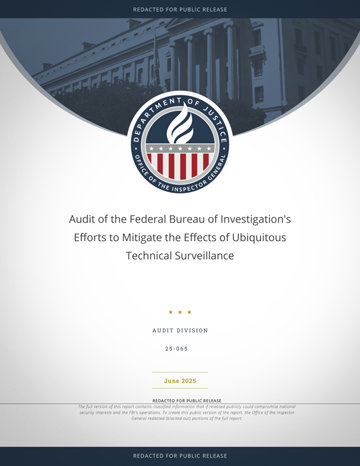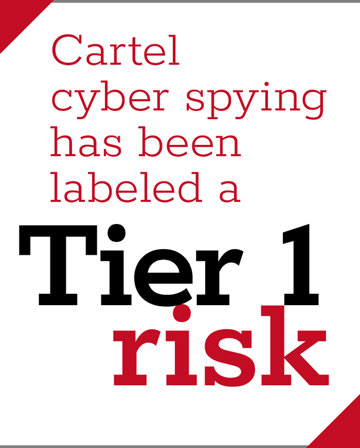And what can be recorded can be hacked.
So, in skilled hands, anonymity is no longer an option. You are seen, you are known—and that includes your movements, your location and, of course, your allegiances.
“Some within the FBI and partner agencies, such as the Central Intelligence Agency (CIA) have described this threat as ‘existential.’”
It’s called “Ubiquitous Technical Surveillance” (UTS)—constant and widespread monitoring used to watch everyone everywhere, through phones, security cameras, internet monitoring, voice recording, facial recognition and a constantly widening web of ingenious and subtle methods. Brick-and-mortar stores use it for safety. The government, they’d like you to think, uses it for your protection. Internet platforms use it to control people and erase privacy.

And to drug cartels who hack into it to expose, intimidate and kill agents and cooperating witnesses, it’s manna from heaven that provides them with all of the above.
Today’s cartels don’t just deal in drugs—they deal in data—breached, analyzed and weaponized against their enemies.
A newly released Justice Department report reveals that the Sinaloa Cartel hired a hacker in or before 2018 to surveil a senior FBI official in Mexico City. The hacker took advantage of Mexico City’s camera system to track the official and identify contacts, while also getting his mobile call details. This intelligence was then used to “intimidate and, in some instances, kill potential sources or cooperating witnesses.”
In other words, a drug cartel being tracked by law enforcement used high tech and intelligence to turn the tables in order to hunt and kill its pursuers.
That’s the level of threat the Justice Department is dealing with—and why, recognizing the grave danger to its mission of law and order, the FBI elevated UTS to a “Tier 1 Enterprise Risk” in January 2023 and established a “Red Team” to identify ways to mitigate it.
But according to the Office of the Inspector General’s report, those efforts were “inadequate.”
The report, published last month, admits that, “Some within the FBI and partner agencies, such as the Central Intelligence Agency (CIA) have described this threat as ‘existential.’”
The term is used to describe a danger so severe that, were it to occur, everything would come to an end. In the Justice Department report, the existential threat described is to itself.

But drugs and their spread pose the greater existential threat—one with stakes so high they can wipe out a human life, a country or a civilization.
“The drug scene is planetwide and swimming in blood and human misery,” Scientology Founder L. Ron Hubbard wrote. “Research demonstrates that the single most destructive element present in our current culture is drugs.”
The FBI is hard at work on a “strategic plan” to address the threat. Questions about the plan were referred to the Justice Department, but as of this writing, remain unanswered.
One strategic plan, however, is already working: cutting off the drug trade at its source. How? Driving down demand through education. If people know what they’re getting into long before they get into it, chances are they won’t get into it.
The proof lies in the Foundation for a Drug-Free World’s Truth About Drugs initiative, which has helped 1 billion people worldwide get the straight facts about drugs—empowering them to say “no thanks” and let the death train pass them by.
Then drug criminals can track you, me and everyone else until the cows come home, for all we care—because we’ll be done with them and, like discarded rubbish, they won’t be long for this world.






















